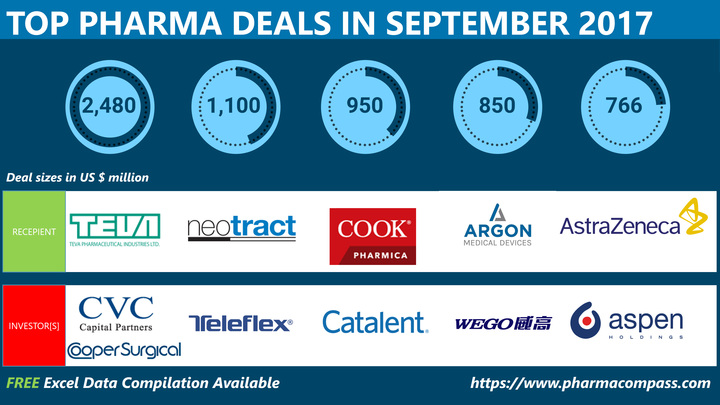In our continuous endeavor to share business intelligence that can help grow your pharmaceutical business, PharmaCompass had introduced PharmaFlow last month — a monthly roundup of deals and investments
from across the globe.
By
tracking investments and M&As in the global pharmaceutical
industry, we hope to provide our readers with an insight into the breakthrough
technologies and business trends of the future.
In
September, Teva continued to divest in order to reduce
its US$ 35 billion debt burden incurred last year due to the acquisition of the
generics division of Allergan. Meanwhile, the world of pharmaceuticals
saw deals in the medical devices space, and the Chinese drug industry continued
to expand its global footprint.
Click here to view the major deals in September 2017 (Excel
version available) for FREE!
Teva’s disinvestments lead the deals in September
Debt-laden Teva Pharmaceuticals, the world’s leading generic drug manufacturer, continued to look for divestiture opportunities and sealed three separate divestments that together fetched US$ 2.48 billion. The Israeli drugmaker, which also got a new CEO (Kåre Schultz) last month, announced it would use the proceeds to repay its term loan debt.
Capital Partners Fund VI acquired a portfolio of products from Teva’s global women’s health business, spanning contraception, fertility, menopause and osteoporosis for US$ 703 million in cash. The portfolio of products, marketed and sold outside of the US, includes brands such as Ovaleap, Zoely,
Seasonique,
Colpotrophine
and Actonel.
Combined annual net sales of these and other products within this portfolio for
2016 were US$ 258 million.
Teva has also entered into an agreement under which Foundation Consumer Healthcare will acquire Plan B One-Step and Teva’s value brands of emergency contraception (Take Action, Aftera, and Next Choice One Dose) for US$ 675 million in cash. Combined annual net sales of Plan B One-Step, Take Action, Aftera, and Next Choice One Dose were US$ 140 million in 2016.
Click here to view the major deals in September 2017 (Excel
version available) for FREE!
Teva also entered into a definitive agreement with CooperSurgical, under which the latter will acquire Paragard (intrauterine copper contraceptive), a product within its global women’s health business, for US$ 1.1 billion cash. Paragard posted revenues of approximately US$ 168 million for the trailing 12 month period ending June 30, 2017. This transaction also includes the sale of Teva’s manufacturing facility in Buffalo, New York, which produces Paragard exclusively.
M&As in the next generation medical
devices space
NeoTract acquires Teleflex: September also saw the acquisition of NeoTract by Teleflex Incorporated. NeoTract is a privately-held medical device company that has developed and commercialized the US FDA-cleared UroLift System — a novel, minimally invasive technology for treating lower urinary tract symptoms due to benign prostatic hyperplasia, or BPH. Performed primarily through a transurethral outpatient procedure, the UroLift System delivers permanent implants that hold open the urethra, reducing the prostate obstruction without cutting, heating, or removing prostate tissue. Teleflex saw significant potential in NeoTract’s technology and acquired the company in early September, in a transaction valued up to US$ 1.1 billion.
Click here to view the major deals in September 2017 (Excel
version available) for FREE!
Under the
terms of the agreement, Teleflex will acquire NeoTract for an upfront cash
payment of US$ 725 million, and will pay up to an additional US$ 375 million
upon the achievement of certain commercial milestones related to sales through
the end of 2020.
In 2016,
NeoTract reported 178 percent year-on-year growth as its revenues grew to US$
51 million compared to approximately US$ 18 million in 2015.
Shandong Weigao acquires Argon Medical
Devices: In another major medical device deal announced in September, China’s Shandong Weigao Group Medical Polymer agreed to buy closely held Argon Medical Devices for US$ 850 million. Argon, which posted revenues of US$ 225 million last year, makes devices including biopsy products, drainage catheters and systems that remove blood clots. Once the purchase is complete, Argon will become one of Shandong Weigao’s “core platforms” for overseas expansion.
Chinese companies carry
on with their global acquisition spree
Shandong Weigao isn’t alone as according to Bloomberg data, Chinese companies had announced
US$ 4.3 billion in US health-care deals until September, more than double the
US$ 1.9 billion in purchases for the same period in 2016.
Chinese deals in Canada, US: In January this year, Chinese conglomerate Sanpower Group had acquired Valeant Pharmaceuticals’ Dendreon cancer business for US$ 819.9 million. Dendreon makes the prostate cancer vaccine — Provenge.
In June this year, Chinese contraceptives maker Humanwell Healthcare Group agreed to
buy US-based RiteDose for about US$ 605 million by becoming a part of a joint stock company.
Fosun resurrects India deal: In September, Shanghai Fosun Pharmaceutical Group resurrected its deal to overcome concerns raised by the Indian
government, by scaling down the stake it proposed to purchase in Gland Pharma from 86 percent to 74 percent. Fosun now proposes to pay US$ 1.1 billion for the 74 percent stake. The acquisition will give Fosun access to the Indian drugmaker’s portfolio of generic injectable medicines that are primarily exported to the US.
Zai Lab’s US IPO: Last month, China-based Zai Lab — a Chinese biotech focused on oncology,
autoimmune and infectious diseases — raised US$ 150
million in its US IPO after the company increased the size of the offering to 8
million shares, from the originally proposed 5.8 million shares. Demand for the
shares was strong, and Zai's stock opened 50 percent above the IPO price
valuing the company at US$ 1.4 billion.
Click here to view the major deals in September 2017 (Excel
version available) for FREE!
Aspen
acquires another portfolio of drugs from Big Pharma
Last year, Italian antitrust authorities fined South Africa-based drugmaker Aspen Pharmacare nearly US$ 5.5 million for halting supplies of
several cancer drugs. This was seen as a negotiating tactic designed to hike
drug prices by as much as 1,500 percent.
The
products whose supplies were halted were: Leukeran 2 mg (chlorambucil); Alkeran 50 mg / 10 mg powder and solvent (melphalan); Alkeran 2 mg (melphalan); Purinethol 50 mg (mercaptopurine); and Thioguanine 40 mg (thioguanine).
The
price-gouging episode began after Aspen purchased the drugs from GlaxoSmithKline. It then began negotiations with the Italian
Medicines Agency over pricing for the cancer medicines. According to the
Italian Competition Authority, Aspen also used the threat of a shortage to
achieve the high prices it had sought, because the drugs temporarily
disappeared from the market.
Last
month, as part of its continued drive to purchase a portfolio of products from
major pharmaceutical companies, AstraZeneca announced that Aspen Global Incorporated (AGI)
will acquire the residual rights to the established anesthetic medicines
comprising Diprivan, EMLA, Marcaine, Naropin, Carbocaine, Xylocaine/Xylocard/Xyloproct, and Citanest.
AstraZeneca had entered into an agreement with AGI in June 2016, under which AGI had gained
exclusive commercialization rights to these medicines in markets outside the
US. Under the terms of the new agreement, AGI will now acquire the remaining
rights to the intellectual property and manufacturing know-how related to the
anesthetic medicines for an upfront consideration of US$ 555 million.
Additionally, AGI will pay AstraZeneca up to US$ 211 million in
performance-related milestones based on sales and gross margin during the
period September 1, 2017 to November 30, 2019.
Click here to view the major deals in September 2017 (Excel version available) for FREE!
Major CDMOs continue to expand manufacturing footprint
Contract
development and manufacturing organizations (CDMO) continued to bulk up their
manufacturing capabilities. First, Catalent announced it would purchase Cook Pharmica in a transaction valued at US$ 950
million. Catalent
intends to use the acquisition to invest aggressively in Cook Pharmica and
create a biologics development and manufacturing center of excellence.
Another CDMO — Avara Pharmaceutical Services — had acquired a Pfizer facility in Italy in August. Last month, Avara entered into an agreement with GSK to acquire a GSK consumer
healthcare manufacturing facility in Aiken, South Carolina. The terms of the
agreement were not disclosed.
Our view
Our technology of the month for August 2017 — CAR-T therapy for cancer — got another boost as Gilead (which had acquired Kite Pharma for US$ 11.9
billion in August) received approval last week for Kite’s most advanced CAR-T therapy candidate — axicabtagene ciloleucel (axe-cel). Gilead has announced a price significantly lower than the launch price at which Novartis
is selling its CAR-T treatment (Kymriah).
While the man who led CAR-T therapy program at Novartis — Vasant Narasimhan — went on to become the Swiss drugmaker’s CEO last month, its ex-CEO Joe Jimenez told Forbes magazine in an interview that he is “ready to return to Silicon Valley.”
In his interview, Jimenez, 57, indicated what he
thought he could be doing next.
“When I think of what really excites me, it’s where biology comes together with technology, like when you think about what’s happening right now in the Valley in California,” Jimenez said.
According to the interview, Jimenez is not ruling out joining another big company. He is fascinated by more entrepreneurial startups, and “sees an opportunity for those who understand healthcare to bridge the gap between brilliant techies and a broken system”.
He got a glimpse of this potential, he says, from Novartis’ efforts with Verily, the life sciences arm of Alphabet (formerly Google). The companies have been working on smart ocular devices, a contact lens that can monitor the sugar levels of diabetics
through their tears. Jimenez says there is a prototype of this lens, which
showed him that engineering could benefit from healthcare knowhow.
Jimenez isn’t alone in banking on biotech. In September, two former GSK executives — its former CEO Andrew Witty and its one-time research head Moncef Slaoui — announced their moves into the biotech, venture
capital space.
Our view is that large pools of capital combined
with the finest talent would certainly lead to some breakthrough technologies
in the pharmaceutical industry in the near future. Watch this space for more.
Click here to view the major deals in September 2017 (Excel version available) for FREE
Impressions: 2597
This week in Phispers, read about the extortion cyberattack and how it impacted hospitals in the UK. There is news on GSK, and its plans to buyout Novartis’ stake in their consumer health JV. Its blockbuster Advair got a shot in the arm as another generic failed endpoints. There is also news on mergers, acquisitions and layoffs and how the US FDA’s new commissioner is reorganizing its inspection staff.
Ransomware attack cripples NHS in the UK; such threats likely to grow
The ‘ransomware’ extortion cyberattack took the world by a storm last week. And if the UK’s National Cyber Security Centre is to be believed, more cases of the ransomware are expected to come to light, “possibly at a significant scale”.
Last weekend, a
huge extortion cyberattack hit
countries across the globe, holding computer data for ransom at hospitals and
several firms.
Two security firms — Kaspersky Lab and Avast —said they had identified the malware behind the attack that impacted over 70 countries. Russia was hit hardest.
The attack hit National Health Service (NHS) — UK’s health service — forcing hospitals to close wards and emergency rooms. Across the country, hospitals found themselves without access to their computers and phone systems. Many patients were sent home as their records could not be accessed.
While there has
not been any fresh attack so far, according to a BBC news report, at least 16 trusts out of 47 of the NHS that were hit are still facing
issues, leading to further cancellations and delays to services.
Ransomware is a
type of malicious software that blocks access to a computer system until a sum
of money is paid, usually via bitcoin (the digital currency), to release
it. According to news reports, the
ransomware threats are likely to grow across private and public sectors.
Thermo Fisher
buys Patheon; INC merges with inVentiv; Paraxel plans layoffs
Thermo Fisher Scientific Inc continued its acquisition spree last
week with the US$ 5.2 billion purchase of drug-development technology company Patheon NV.
Thermo Fisher has emerged as one of the world’s
biggest manufacturers of diagnostic and testing equipment through deals. Over
the last five years, Thermo Fisher has made acquisitions worth US$ 22 billion.
It will pay US$ 35 a share in cash for Patheon — a 35 percent increase over Patheon’s closing price on Friday last.
Meanwhile, INC
Research Holdings Inc announced last week that it would merge with private
equity-owned inVentiv Health Inc, another contract research organization (CRO),
in a US$ 4.6 billion all-stock deal.
The deal is expected to help INC win contracts with large pharma companies.
Another CRO — Paraxel — plans to lay off staff, as rumors
of a potential buyout gather steam after the company projected lower revenues. In a filing with the SEC on May 4, the
Massachusetts-based company outlined plans to cut 1,200 jobs at the global
clinical trial operation.
Weeks after
staff plotted to destroy drugs, EU probes Aspen for price
gouging
Last month, Phispers
had carried a news nugget on Africa’s leading drug company — Aspen Pharmacare — and how its employees had reportedly plotted to destroy stocks of
life-saving medicines during a price dispute with the Spanish health service in
2014.
This week, the
European Commission initiated a formal probe into
concerns that Aspen Pharma is charging excessive prices for five life-saving
cancer medicines. The Commission will investigate whether Aspen has abused a
dominant market position and breached EU antitrust rules. If found guilty, this
could lead to a hefty fine for
Aspen.
The investigation is around Aspen's pricing practices for niche medicines containing the active pharmaceutical ingredients (APIs) — chlorambucil, melphalan, mercaptopurine, tioguanine and busulfan. These APIs are used for treating cancer
and are sold with different formulations and under multiple brand names. Aspen
acquired these drugs after their patents expired.
The investigation
will cover all of Europe except Italy, which hit the company with a Euro 5
million fine in October last year for price hikes up to 1,500 percent for some
key drugs.
Investors fume over GSK’s plan to buyout Novartis stake in consumer health
GlaxoSmithKline has informed its shareholders that it
plans to buy out Swiss drugmaker Novartis’ 36.5 per cent stake in GSK Consumer Healthcare.
GSK is planning to offer £8 billion (US$ 10.3
billion) to Novartis for this stake and industry observers say Novartis could
use the gains to fund a megatakeover.
And its potential target is AstraZeneca. Novartis’ buyout of AstraZeneca, if realized, could reshape the oncology landscape.
Buying out Novartis would give GSK control over the world’s biggest consumer health operations. And a firm control over its strong brands like Horlicks, Nicorette and Beechams. The move is in line with GSK’s new CEO Emma Walmsley’s recent statements.
However, GSK’s shareholders have not taken the news well. GSK’s star investor Neil Woodford was pushing for a company-wide breakup. GSK, however, preferred to hang onto the business, and Walmsley—who was the former head of the JV—confirmed the strategy on the company’s first-quarter earnings call. As a result, Woodford decided to sell his (£1.2 billion) GSK holding.
Woodford held his shares in GSK for more than 15 years. ‘The sum of the parts is significantly greater than the whole,” he said. “My viewpoint, and that of other like-minded institutional investors, has been heard but ultimately ignored – repeatedly,” he added. Woodford wanted GSK to split into more focused businesses.
New FDA
Commissioner reorganizing inspection staff
The US Food and Drug Administration’s new commissioner — Scott Gottlieb — wants federal inspectors to specialize in certain areas, in order to ensure the safety of America’s food and medical products.
In a memo,
Gottlied announced that workers in the US FDA’s Office of Regulatory Affairs will begin focusing on overseeing specific product areas — such as pharmaceuticals or medical devices — rather than activities in their US geographic regions.
“This organizational approach replaces a management structure based on geographic regions,” says the FDA website.
The US FDA’s staff of 4,000 probes consumer complaints, oversees imported goods, and inspects domestic and foreign facilities to ensure compliance with the agency’s standards.
The refocusing “will make our field programs more modern and responsive to today’s threats and challenges, while making sure that we are taking a risk-based and science-based approach to our work,” Gottlieb said in the memo. “We need to make sure that we are achieving the greatest degree of consumer protection with the resources that we have,” he added.
The initiative was
proposed four years ago, with implementation set to start this month.
Merck’s Keytruda approved for lung cancer; AstraZeneca, Roche suffer setbacks
Merck’s Keytruda got approved by the US FDA for treatment of advanced lung cancer, when used in combination with
chemotherapy. This bolsters Merck's lead position in the field of medicines
that help the immune system fight cancer.
Lung cancer is by
far the largest oncology market and the approval significantly expands the
number of patients available for the Keytruda therapy, in combination with Eli Lilly's Alimta.
Roche,
AstraZeneca drugs fail trial:
AstraZeneca suffered a setback last week when its Phase III asthma drug tralokinumab — IL13 — saw a late-stage failure.
This drug had
already failed a Phase IIb trial for asthma, raising questions why the company
went ahead with the trial and plans to continue a major late-stage effort. But
the researchers at the time said they were encouraged by a subgroup analysis
that pointed to success.
Roche too suffered a setback as its drug tecentriq (atezolizumab)
failed the late-stage confirmatory study in bladder cancer. The drug failed to
significantly improve overall survival. The blow raises questions about the
fate of this drug.
After Mylan, Hikma’s Advair generic runs into “major” problems
GSK’s blockbuster lung drug Advair may escape generic competition
in the United States this year. In March, Mylan’s application for a cut-price equivalent was turned down by the US FDA. And last week, the application of Hikma Pharmaceuticals and its partner Vectura was turned down by the American regulator.
Industry analysts
believe the generic threat has now been pushed back until mid-2018, providing
GSK with a short-term profit boost.
According to
Hikma, there were major issues with the application, which is why the US FDA
decided not to approve its version of the inhaled treatment for asthma and
chronic lung disease at this time. The firm said it was unlikely to receive approval
this year.
Hikma and Mylan have received complete response letters from the FDA that were categorized as ‘major’. Dealing with a major amendment to a generic drug application means a delay of 10 months for an FDA response.
Meanwhile, Mylan
President Rajiv Malik said last week that the company disagrees with US FDA’s reasoning behind not approving its generic for GSK’s Advair in March.
Malik said the FDA was asking it to comply with standards set out in draft guidance the agency had issued. But the company believes it is not required to do so. Mylan made the comments while reporting its first-quarter earnings.
Impressions: 2766
This week, Phispers gets you news on illegal exports of Metformin in India, Hillary Clinton’s stance on price gouging, a report’s recommendations on reducing India’s dependence on Chinese APIs, Pfizer’s patent dispute case in the UK and more.
Aspen Pharma fined for price
gouging in Italy
Last week,
Italian antitrust authorities fined South Africa-based drug maker Aspen Pharmacare nearly US $ 5.5 million for
halting supplies of several cancer drugs. This is being seen as a negotiating
tactic designed to hike prices by as much as 1,500 percent.
The
products whose supplies were halted are: Leukeran 2 mg (chlorambucil);
Alkeran 50 mg / 10 mg powder and solvent (melphalan);
Alkeran 2 mg (melphalan); Purinethol 50 mg (mercaptopurine);
and Thioguanine 40 mg (thioguanine).
The
price-gouging episode began after Aspen purchased the drugs from GlaxoSmithKline. It then began negotiations with
the Italian Medicines Agency over pricing for the cancer medicines. According
to the Italian Competition Authority, Aspen also used the threat of a shortage
to achieve the prices it had sought, because the drugs temporarily disappeared
from the market.
It would
be interesting to see the price rise in the US market for these products since Chlorambucil
and Thioguanine have no generics in the United States. Clinton’s team had debated attacking FDA commissioner Califf, reveals WikiLeaks
Around
this time last year, the pharmaceutical industry had come under severe
criticism for price gouging. And, if emails released by WikiLeaks are to be believed, Hillary Clinton’s campaign team had debated attacking Dr. Robert Califf, over his ties with various drug makers. Back then, Califf had been nominated to head the US Food and Drug Administration. Earlier this year, Califf got named as FDA commissioner.The email thread, pertaining to September 21-26, 2015, suggests how the issue had become a factor in her campaign. Through these emails, few members of Clinton’s team had weighed the pros and cons of picking a fight that would “fit into the larger themes we are trying to promote,” an email written by Clinton’s campaign press secretary had said.Similarly, a senior policy advisor had written: “We could certainly signal that we want someone willing to stand up to pharma.”Califf was
the founding director of the Duke Clinical Research Institute, which conducts
studies for companies. He has authored numerous papers with industry
researchers. Two years ago, several large drug makers had partly supported his
salary, while many others paid him for consulting work. These
email exchanges took place amid rising outrage over price gouging, triggered by
Martin Shkreli (founder and former CEO of Turing Pharmaceuticals). In September
last year, Clinton had taken a jab at Shkreli through a tweet, for hiking the
price of the antimalarial drug Daraprim by more than 5,000 percent. Clinton’s campaign staff had tweeted: “FYI – We have started the war with Pharma!!” Last
month, Clinton issued a plan to contain prescription drug pricing. She proposed
a federal panel of officials to determine if price increases for certain drugs
are justified, authorize the federal government to directly purchase drugs
through imports of competing drugs from other countries, and fine offending
companies. India initiates action against two Metformin
makers for illegal exports
The Food
and Drug Administration of Maharashtra, India has initiated action against two pharmaceutical companies – Pharmaceutical Products of India Ltd and Wanbury – for illegally rebranding and exporting a diabetic drug to Mexico, Brazil, Bangladesh and Pakistan.A part of the bulk drug – metformin hydrochloride – was being manufactured by Pharmaceutical Products of India, based in Tarapur. It was manufacturing 300,000 kilos of metformin hydrochloride for export every month. The company, however, did not have an export licence. On further investigation, the department found that the drug was sold to another firm – Wanbury in Patalganga – that had an export licence. The modus operandi was clear – Wanbury had an export licence and orders worth 650,000 kg per month of metformin HCL, but had a shortfall of 350,000 kg in manufacturing capacity, which was being fulfilled by Pharmaceutical Products of lndia. “Wanbury would just stick their labels on the drugs supplied by the latter without any quality checks,” said a Maharashtra FDA official. “Such unholy alliances can have disastrous effects on the country's drug export sector,” the official added. The companies have been charged under the Drugs and Cosmetics Act. Industry watchers share how
deregulation brings further risks
Last week,
in Speak Pharma, Bernard Plau, CEO of
Akovia Consulting, talked about how fraud broke the trust of regulators. And this week, industry watchers – Dinesh Thakur and Prashant Reddy Thikkavarapu – share how deregulation by the Drug Controller General of India (DCGI) brings further risk, in an article published on The News Minute, titled “Deregulation of the pharma industry in the time of scandals’.
Since the Ranbaxy scandal, there have been several
other scandals in the Indian pharmaceutical industry, and these have involved
big names such as Sun, Dr. Reddy’s, Wockhardt, GVK Bio and Alkem. These companies have come under
scrutiny from foreign drug regulators.
Thakur and
Thikkavarapu say two kind of scandals have plagued the Indian pharma industry. The
first is related to data fabrication by contract research organisations (CROs)
that conduct bioequivalence (BE) testing. The second type involves drug
companies indulging in fabrication of data during quality testing.
“Instead of increasing regulatory scrutiny, the DGCI has been on a drive to reduce the regulation governing the Indian pharmaceutical industry in the name of ‘Make in India’,” they added.
Indian trade body study suggests
ways of reducing dependence on Chinese APIs
A study
undertaken by trade body Assocham and market research firm RNCOS has
highlighted how India’s overwhelming dependence on China for APIs has emerged as a worrisome area. The study has recommended steps that can help reduce imports of APIs from China – which stand at Rs 138.53 billion (US $ 2.08 billion), or 65.29 percent of the total API imports of Rs 212.16 billion (US $ 3.18 billion).
“This is all the more disconcerting in the face of louder narrative against reducing trade gap with China, which is well over US $ 51 billion,” the study says.
One of the main reasons for huge API imports from China is the low cost of manufacturing and subsidy there. Moreover, India levies negligible import fee. “The import fees should be increased in line with other counterparts”, the paper said.
The
existence of multiple regulatory authorities for renewal of licences by India’s bulk drug manufacturers is also affecting production. “Therefore a single committee of various government departments should be formed to regulate the industry through a single window and audit of plants,” the study said. It also recommended developing mega parks for APIs across the country.
More bad news for Teva as it mulls acquisition of Korea’s CelltrionLast week,
PharmaCompass covered Teva’s misadventure in Mexico. Little did we know that more bad
news awaited Teva. Just one month after Teva paid Regeneron US $ 250 million to get access to a new pain drug – fasinumab, the FDA has put its clinical trial on hold. The news
comes at a time when Teva is said to be considering the acquisition of South Korea’s Celltrion in order to strengthen its biosimilar portfolio. Going forward, biosimilars are said to be a key element of Teva’s overall strategy.
Teva and Regeneron’s fasinumab was being studied in a Phase IIb trial in chronic low back pain, among others tests including osteoarthrosis pain. The FDA is now asking the two partners for “an amendment of the study protocol” after seeing a case of adjudicated arthropathy (a disease of the joint) in a patient receiving high-dose fasinumab, who had advanced osteoarthritis.The two
companies said they would now set about designing a pivotal Phase III study in
chronic low back pain that specifically excludes patients with advanced
osteoarthritis in the hope this was a one-off related to this disease. Pfizer loses appeal in a UK patent
dispute case over Lyrica
Pfizer lost an appeal in a UK patent dispute over Lyrica, one of the company’s top-selling drugs. The Court of Appeal upheld a 2015 verdict that had struck down key patent claims on Lyrica by Pfizer and cleared Allergan Plc’s Actavis generic unit of infringing it.
The
disputed patent covers the use of pregabalin for the treatment of pain. The business was bought by Teva this year. In 2015, Lyrica – which is also used to treat epilepsy – generated sales of US $ 4.8 billion for Pfizer.
Pfizer has
also sued Dr. Reddy’s Laboratories and Teva Pharmaceutical Industries
over their generic pregabalin products. These days, Lyrica is used more for
pain than for its original indication as a seizure drug.
Pfizer now
hopes to take its fight to the UK Supreme Court. “We maintain our belief in the validity and importance” of the patent, said Pfizer spokeswoman.
Explosion at BASF’s biggest plant in Germany kills twoOn October
17, an explosion and fire at chemicals maker BASF's production site in Germany is said
to have killed at least two people and severely injured six.
The explosion occurred at around 11.20 am local time, on a supply line connecting a harbor and a tank depot on the Ludwigshafen site. BASF is the world’s biggest chemicals company and the Ludwigshafen site, which is situated around 80 km south of Frankfurt, is the world's largest chemical complex, covering an area of 10 square km. The site employs 39,000 workers. Located on the Rhine river, the Ludwigshafen site receives many of its raw materials by ship.
The
company said it was unclear so far what caused the explosion. BASF is also
unclear about the financial impact of the explosion.
Impressions: 4737
PharmaCompass has assessed the second quarter US Drug Master
File (DMFs) filings. In our view, with five potential first-to-file (FTF)
applications along with another five DMFs challenging markets that have been
monopolized for decades, the pharmaceutical industry in the United States
should brace itself for some serious shakeups. Unlike the first
quarter of 2015 where 241 new DMF filings were listed on the USFDA site,
this quarter saw a reduction of almost 35 percent in the DMFs filed. As DMFs
form a critical part of the regulatory submissions made by generics to
challenge innovator companies, a reduction in filings, in the recent quarter,
seems to bear no correlation with the disruption the market will potentially
witness in times to come. The ‘first-to-file’ disruptors Profits in the generic pharmaceutical business are highly dependent on how quickly a drug is introduced in the market. The ‘first-to-file’ generic is a coveted position, since the company is legally granted
a 180-day period of market exclusivity, where no other generic can be in the
market. This six month exclusivity invariably leads to windfall gains for the
company.This quarter DMFs were received by the FDA, which could potentially drive the first-to-file challenges against J&J’s blockbuster Inovkana (canagliflozin), Eisai’s Belviq (lorcaserin
hydrochloride), Incyte’s Jakavi (ruxolitinib
phosphate), Celgene’s Pomalyst (pomalidomide) and Akorn’s Zioptan (tafluprost).However, given the complexities involved in bringing a
generic product to market, the first DMF filing does not always result in the
first generic challenge to the brand drug. The second DMFs filed for a product
are also strong contenders which must not be ignored. For example, Glenmark
recently filed their DMF for tofacitinib,
almost 18 months after serial-DMF filing by MSN
Pharmaceuticals. But Glenmark
has moved ahead by already getting their DMF reviewed by the FDA. Similarly, while Alp Pharma Beijing’s dapagliflozin, Perrigo’s ferric citrate and Amino Chemicals’ miglustat
are the second DMFs to be received by the FDA, the innovator should start
counting the days before they are plagued by generic challengers. Exclusively
not-patentedFor several years, Indian companies have been leading many
first-to-file generic challenges in the United States. However, as they have
scaled up in size, the same companies have also obtained rights to some
exclusive markets in the United States; either through acquisitions or
alliances. Sun Pharmaceutical’s US
$ 230 million acquisition of dermatology specialist Dusa was triggered by the successful sales of Dusa’s photo-chemotherapy treatment, Levulan. German Midas Pharma GmbH’s filing will not only subject Sun’s market domination to generic competition, the fact that there are six other DMFs filed for this product (of which none of the filings have come from Indian or Chinese companies) indicates a change in the way the industry is beginning to operate. Like Sun Pharmaceutical’s monopoly of Levulan, Dr. Reddy’s has enjoyed no competition for their topical treatment, Cloderm (clocortolone
pivalate) since 2011 when they purchased the rights for the product by
making an
upfront payment of US $ 36 million to Canadian, Valeant Pharmaceuticals. Dr. Reddy’s needs to start monitoring the progress of Italian Trifarma’s filing since this is the fifth time a DMF for this product has been received by the FDA.Indian companies aside, Aspen’s Leukeran, Bausch & Lomb’s Zirgan, Mission Pharmaceuticals’ Thiola and GSK’s topical treatment Abreva have
all marketed their products without any competition. The DMF filings of this
quarter indicate that generics have narrowed in on the profits being made and
the market dynamics for these products will change in the future. Down, but not outIntriguingly, companies like Apotex
Pharmachem, Emcure
Pharmaceuticals and Global Calcium
are currently on the FDA Import Alert list and banned from exporting products
to the United States since they did not operate in
conformity with the current good manufacturing practices (GMP's). However, these companies are definitely optimistic about
their future since they have all filed new DMFs this quarter. It remains to be
seen if the bans will get lifted in the near future.This quarter also saw Dr. Reddy’s get creative in their challenge to Japanese Astellas Pharma’s leaky bladder treatment, Myrbetriq (mirabegron).
After having filed a DMF last year, they re-filed again recently, with a
different polymorphic form, to potentially circumvent the patents around this
product. Our supportGeneric pharmaceutical companies are continuously looking
for opportunities where they can get the maximum possible market share in the
fastest way possible. While the number of manufacturers of active pharmaceutical
ingredients (APIs) keep increasing, we are also witnessing an increase in the cost
of regulatory support required to sustain the production of these APIs. The industry is becoming more challenging – identifying target markets is becoming a science which requires high-level management focus. In order to help you, PharmaCompass will share its compilation of this quarter’s DMF filing list. Just send
us an email by clicking here and we’re happy to support you in every possible way.Last week, the FDA also announced the fee dues (as on
October 1, 2015), as per the Generic Drug User Fee Act (GDUFA). We are sharing
the amounts due, in case you have not been able to access this information.
FISCAL YEAR AND FEE TYPE
2014 (Rate)
2015 (Rate)
$ & %
Difference from previous year
Abbreviated New Drug Application
$63,860
$58,730
-$5,130 (-8.0%)
Prior Approval Supplement
$31,930
$29,370
-$2,560 (-8.0%)
Drug Master File
$31,460
$26,720
-$4,740 (-15.1%)
Finished Dosage Form Facility
$220,152 (Domestic)
$247,717 (Domestic)
$27,565 (12.5%)
$235,152 (Foreign)
$262,717 (Foreign)
Active Pharmaceutical Ingredient
Facility
$34,515 (Domestic)
$41,926 (Domestic)
$7,411 (21.5%)
$49,515 (Foreign)
$56,926 (Foreign)
Impressions: 5140
















